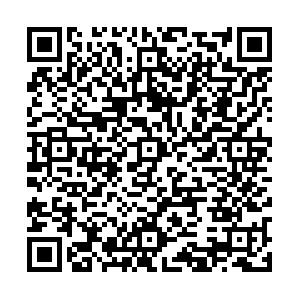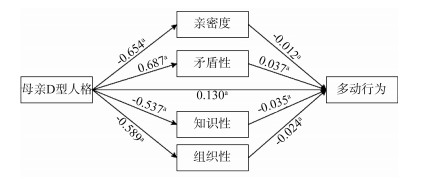Associations between preschool children's hyperactive behaviors, parents' type D personality and family environment
-
摘要:
目的 探讨学龄前儿童的多动行为与父母D型人格及家庭环境的关系。 方法 以深圳市龙华区2016-2017年小班儿童及父母为调查对象,应用多重线性回归分析父母D型人格、家庭环境与多动行为的关联,应用中介分析评价家庭环境在父母D型人格与儿童多动行为关联中的中介作用。 结果 父母D型人格与家庭环境的矛盾性(母亲:β=0.687;父亲:β=0.694)、儿童的多动行为水平(母亲:β=0.164;父亲:β=0.130)呈正关联,而与家庭环境的亲密度(母亲:β=-0.654;父亲:β=-0.665)、知识性(母亲:β=-0.537;父亲:β=-0.394)、组织性(母亲:β=-0.589;父亲:β=-0.459)呈负关联。儿童多动行为水平与家庭环境的亲密度(β=-0.010)、知识性(β=-0.033)、组织性(β=-0.022)与呈负关联,而与家庭环境的矛盾性(β=0.034)呈正关联。家庭环境的亲密度、矛盾性、知识性、组织性在父母D型人格与儿童多动行为关联中起部分中介作用,中介效应百分比介于4.88%~20.00%。 结论 父母D型人格可增加学龄前儿童多动行为发生的风险,其中部分是通过营造不同家庭环境对儿童多动行为产生作用。 Abstract:Objective To explore the associations with children's hyperactive behaviors and parental type D personality (TDP) and family environment. Methods A cross-sectional survey was conducted among children from LongHua District of Shenzhen in China during 2016-2017. Multiple linear regression analysis was employed to assess the associations with children's hyperactive behaviors, parental TDP and family environment. Mediation analysis was applied to explore the mediating role of family environment on the associations between parental TDP and children's hyperactive behaviors. Results Parental TDP was positively associated with the conflict dimension (maternal: β=0.687; paternal: β=0.694) and children's hyperactive behaviors (maternal: β=0.164; paternal: β=0.130), while it was negatively correlated with the cohesion (maternal: β=-0.654; paternal: β=-0.665), intellectual-cultural orientation (maternal: β=-0.537; paternal: β=-0.394) and organization (maternal: β=-0.589; paternal: β=-0.459) in family context. Children's hyperactive behaviors were negatively associated with the cohesion (β=-0.010), intellectual-cultural orientation (β=-0.033), organization (β=-0.022) in family context, but positively related to the conflict dimension (β=0.034). The cohesion, conflict dimension, intellectual-cultural orientation and organization of family environment partially mediated the relationship between parental TDP and children's hyperactive behaviors, with the proportion of mediation effect from 4.88 to 20.00%. Conclusion Maternal and paternal TDP can increase hyperactive behaviors among children, which partially through creating different family environment. -
Key words:
- Type D personality /
- Family environment /
- Hyperactive behaviors /
- Preschool children
-
表 1 研究对象的一般人口学特征[n(%)]
Table 1. Socio-demographic characteristics of participants [n(%)]
变量名 例数 儿童年龄(x±s, 岁) 3.37±0.34 儿童性别 男 9 214(54.65) 女 7 645(45.35) 是否独生 否 6 554(38.88) 是 10 305(61.12) 母亲年龄(x±s, 岁) 30.69±3.88 母亲学历 高中以下 2 676(15.87) 高中 4 949(29.36) 本科及以上 9 234(54.77) 父亲年龄(x±s, 岁) 33.05±4.48 父亲学历 高中以下 2 159(12.81) 高中 4 110(24.37) 本科及以上 10 590(62.82) 父母婚姻状况 已婚 16 326(96.84) 未婚/离异/丧偶 475(2.82) 不详 58(0.34) 家庭月收入(元) <5 000 2 407(14.28) 5 000~<10 000 4 533(26.88) 10 000~<15 000 3 444(20.43) ≥15 000 6 475(38.41) 表 2 父母亲D型人格、家庭环境与多动行为回归分析结果
Table 2. Results of linear-regression analyses of parents' type D personality, family environment and hyperactive behaviors
因变量 预测变量 回归系数 回归系数的(95% CI)值 P值 模型1 常数项 1.128 (1.044~1.211) <0.001 多动行为 母亲D型人格 0.164 (0.143~0.184) <0.001 父亲D型人格 0.130 (0.107~0.152) <0.001 模型2 常数项 1.316 (1.227~1.405) <0.001 多动行为 亲密度 -0.010 (-0.015~-0.005) <0.001 矛盾性 0.034 (0.030~0.037) <0.001 知识性 -0.033 (-0.036~-0.030) <0.001 组织性 -0.022 (-0.027~-0.018) <0.001 注: 校正的协变量:儿童年龄、性别、是否独生,父母的年龄、教育水平,婚姻状况、家庭月收入。 表 3 父母亲D型人格、与家庭环境线性回归分析结果
Table 3. Results of linear regression analyses of parents' type D personality and family environment
因变量 预测变量 回归系数 回归系数的(95% CI)值 P值 模型1 常数项 7.043 (6.762~7.324) <0.001 亲密度 母亲D型人格 -0.654 (-0.723~-0.584) <0.001 父亲D型人格 -0.665 (-0.740~-0.589) <0.001 模型2 常数项 2.325 (1.983~2.677) <0.001 矛盾性 母亲D型人格 0.687 (0.602~0.772) <0.001 父亲D型人格 0.694 (0.602~0.785) <0.001 模型3 常数项 1.583 (1.195~1.971) <0.001 知识性 母亲D型人格 -0.537 (-0.633~-0.441) <0.001 父亲D型人格 -0.394 (-0.499~-0.290) <0.001 模型4 常数项 4.954 (4.655~5.254) <0.001 组织性 母亲D型人格 -0.589 (-0.663~-0.514) <0.001 父亲D型人格 -0.459 (-0.540~-0.378) <0.001 注: 校正的协变量:儿童年龄、性别、是否独生,父母的年龄、教育水平,婚姻状况、家庭月收入。 表 4 家庭环境在父母D型人格与儿童多动行为关联中的中介作用
Table 4. The mediation effect of family environment on association between parents' type D personality and children's hyperactive behaviors
路径 效应类别 效应值 效应值的(95% CI)值 中介效应百分比(%) 母亲D型人格 总效应 0.164 (0.143~0.184)a 直接效应 0.102 (0.082~0.122)a 间接效应(亲密度) 0.008 (0.004~0.012)a 4.88 间接效应(矛盾性) 0.025 (0.020~0.032)a 15.24 间接效应(知识性) 0.019 (0.014~0.024)a 11.59 间接效应(组织性) 0.014 (0.010~0.019)a 8.51 父亲D型人格 总效应 0.130 (0.107~0.152)a 直接效应 0.075 (0.053~0.097)a 间接效应(亲密度) 0.075 (0.053~0.097)a 6.92 间接效应(矛盾性) 0.009 (0.005~0.013)a 20.00 间接效应(知识性) 0.026 (0.020~0.032)a 10.77 间接效应(组织性) 0.014 (0.006~0.019)a 8.46 注: 校正的协变量:儿童年龄、性别、是否独生,父母的年龄、教育水平,婚姻状况、家庭月收入;aP < 0.001。 -
[1] 静进. 儿童注意缺陷多动障碍诊疗进展[J]. 实用儿科临床杂志, 2012, 27(12): 965-970. DOI: 10.3969/j.issn.1003-515X.2012.12.026.Jing J. Progress of diagnosis and treatment for children with attention deficit/hyperactivity disorders[J]. J Appl Clin Pediatr, 2012, 27(12): 965-970. DOI: 10.3969/j.issn.1003-515X.2012.12.026.j.issn. 1003-515X. 2012. 12.026. [2] Yan S, Cao H, Gu C, et al. Dietary patterns are associated with attention-deficit/hyperactivity disorder (ADHD) symptoms among preschoolers in mainland China[J]. Eur J Clin Nutr, 2018, 72(11): 1517-1523. DOI: 10.1038/s41430-018-0131-0. [3] Thompson JM, Waldie KE, Wall CR, et al. Associations between acetaminophen use during pregnancy and ADHD symptoms measured at ages 7 and 11 years[J]. PLoS One, 2014, 9(9): e108210. DOI: 10.1371/journal.pone.0108210. [4] Lin Q, Hou XY, Yin XN, et al. Prenatal exposure to environmental tobacco tmoke and hyperactivity behavior in Chinese young children[J]. Int J Environ Res Public Health, 2017, 14(10): 1132. DOI: 10.3390/ijerph14101132. [5] Kashdan TB, Adams LM, Kleiman EM, et al. Stress-induced drinking in parents of boys with attention-deficit-hyperactivity disorder: heterogeneous groups in an experimental study of adult-child interactions[J]. J Abnorm Child Psychol, 2013, 41(6): 919-927. DOI: 10.1007/s10802-013-9735-y. [6] 温国明, 赵雅芬, 温慧莹, 等. 学龄前儿童多动-冲动行为与家庭环境的关系[J]. 广东医学, 2016, 37(12): 1864-1865. https://www.cnki.com.cn/Article/CJFDTOTAL-GAYX201612039.htmWen G, Zhao Y, Wen H, et al. The relationship between Hyperactivity-Impulsive behavior and family environment of preschool children[J]. Guangdong Med J, 2016, 37(12): 1864-1865. https://www.cnki.com.cn/Article/CJFDTOTAL-GAYX201612039.htm [7] 冼丹霞. 注意缺陷多动障碍与家庭环境因素相关性的研究进展[J]. 中国儿童保健杂志, 2010, 18(7): 578-579, 590. https://www.cnki.com.cn/Article/CJFDTOTAL-ERTO201007017.htmXian D. Research progress on the correlation between attention deficit hyperactivity disorder and family environmental factors[J]. Chin J Child Heal Care, 2010, 18(7): 578-579, 590. https://www.cnki.com.cn/Article/CJFDTOTAL-ERTO201007017.htm [8] 薛艳丽. 家庭环境因素对学龄前儿童心理行为发育影响[J]. 世界最新医学信息文摘(电子版), 2016, 16(55): 47-48. doi: 10.3969/j.issn.1671-3141.2016.55.034Xue Y. The influence of family environment factors on the psychological behavior development of preschool children[J]. World Latest Med Inf, 2016, 16(55): 47-48. doi: 10.3969/j.issn.1671-3141.2016.55.034 [9] Belsky J. The determinants of parenting: a process model[J]. Child Dev, 1984, 55(1): 83-96. DOI: 10.1111/j.1467-8624.1984.tb00275.x. [10] Denollet J. DS14: standard assessment of negative affectivity, social inhibition, and Type D personality[J]. Psychosom Med, 2005, 67(1): 89-97. DOI: 10.1097/01.psy.0000149256.81953.49. [11] 白俊云, 赵兴蓉, 许秀峰. D型人格量表的信效度检验[J]. 中国心理卫生杂志, 2007(5): 329-332. DOI: 10.3321/j.issn:1000-6729.2007.05.015.Bai JY, Zhao X, Xu X. Reliability and validity of the type D personality scale in chinese[J]. Chin Ment Heal J, 2007, (5): 329-332. DOI: 10.3321/j.issn:1000-6729.2007.05.015. [12] 费立鹏, 沈其杰, 郑延平, 等. "家庭亲密度和适应性量表"和"家庭环境量表"的初步评价——正常家庭与精神分裂症家庭成员对照研究[J]. 中国心理卫生杂志, 1991(5): 198-202. https://www.cnki.com.cn/Article/CJFDTOTAL-ZXWS199105001.htmFei L, Shen Q, Zheng Y, et al. Preliminary evaluation of the family intimacy and adaptability scale and the family environment scale-a controlled study of vormal and schizophrenic family members[J]. Chin J Ment Heal, 1991, (5): 198-202. https://www.cnki.com.cn/Article/CJFDTOTAL-ZXWS199105001.htm [13] 苏林雁, 李雪荣, 黄春香, 等. Conners父母症状问卷的中国城市常模[J]. 中国临床心理学杂志, 2001(4): 241-243, 252. DOI: 10.3969/j.issn.1005-3611.2001.04.001.Su LY, Li XR, Huang CX, et al. Norms of the conners parent symptom questionnaire in Chinese urban children[J]. Chin J clin Psychol, 2001, 9(4): 241-243, 252. DOI: 10.3969/j.issn.1005-3611.2001.04.001. [14] He GH, Liu L, Strodl E, et al. Parental type D personality and children's hyperactive behaviors: the mediating role of Parent(-)Child interactive activities[J]. Int J Environ Res Public Health, 2019, 16(7): 1116. DOI: 10.3390/ijerph16071116. [15] Austerman J. ADHD and behavioral disorders: Assessment, management, and an update from DSM-5[J]. Cleve Clin J Med, 2015, 82(11 suppl 1): S2-S7. DOI: 10.3949/ccjm.82.s1.01. [16] 张亚峰, 孙桂香. 儿童注意缺陷多动障碍家庭危险因素的Meta分析[J]. 中国当代儿科杂志, 2015, 17(7): 721-725. DOI: 10.7499/j.issn.1008-8830.2015.07.016.Zhang YF, Sun GX. A meta analysis of family risk factors for attention deifcit hyperactivity disorder[J]. Chin J Contemp Pediatr, 2015, 17(7): 721-725. DOI: 10.7499/j.issn.1008-8830.2015.07.016. [17] 吴丽慧, 邹长林, 王德选, 等. 小学生注意缺陷多动障碍与家庭因素的相关分析[J]. 中国学校卫生, 2004, 25(4): 416-417. DOI: 10.3969/j.issn.1000-9817.2004.04.028.Wu LH, Zou CL, Wang DX, et al. The relationship between pupil's attention deficit hyperactive disorder and family factors[J]. Chin J Sch Heal, 2004, 25(4): 416-417. DOI: 10.3969/j.issn.1000-9817.2004.04.028. [18] Prinzie P, Stams GJ, Dekovic M, et al. The relations between parents' Big Five personality factors and parenting: a meta-analytic review[J]. J Pers Soc Psychol, 2009, 97(2): 351-362. DOI: 10.1037/a0015823. [19] de Haan AD, Deković M, Prinzie P. Longitudinal impact of parental and adolescent personality on parenting[J]. J Pers Soc Psychol, 2012, 102(1): 189-199. DOI: 10.1037/a0025254. [20] Kochanska G, Aksan N, Penney SJ, et al. Parental personality as an inner resource that moderates the impact of ecological adversity on parenting[J]. J Pers Soc Psychol, 2007, 92(1): 136-150. DOI: 10.1037/0022-3514.92.1.13. [21] Kochanska G, Clark LA, Goldman MS. Implications of mothers' personality for their parenting and their young children's developmental outcomes[J]. J Pers, 1997, 65(2): 387-420. DOI: 10.1111/j.1467-6494.1997.tb00959.x. [22] Prinzie P, Onghena P, Hellinckx W, et al. Parent and child personality characteristics as predictors of negative discipline and externalizing problem behaviour in children[J]. Eur J Pers, 2004, 18(2): 73-102. DOI: 10.1002/per.501. -





 下载:
下载:


